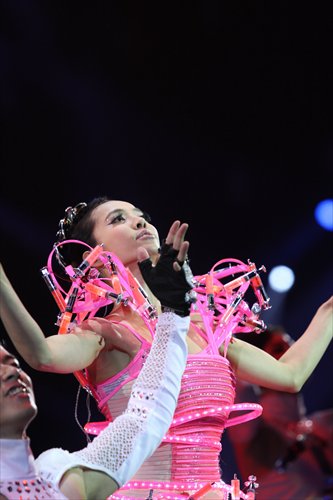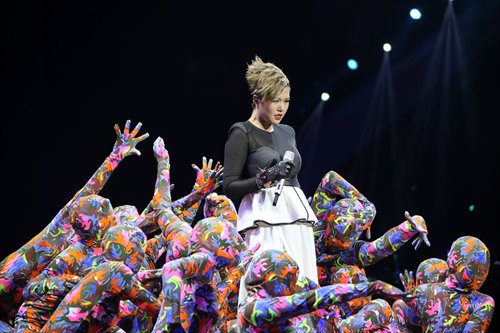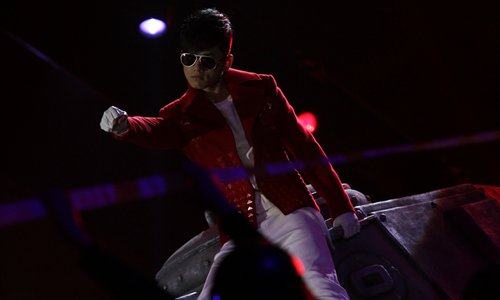HOME >> LIFE
The show must go on
Source:Global Times Published: 2013-12-29 21:18:01

Stars perform at the New Year Gala of Hunan Satellite TV in 2012. Photos: IC
As the year 2013 draws to a close, the meaning of new year's eve has a poetic significance. Dubbed "yisheng yishi," a line from the famous book A Dream in Red Mansions by Cao Xueqin and meaning "for one's whole lifetime," the term has a similar sound in Chinese to the numbers 1-3-1-4, symbolizing the transition between the two years.Implemented by the central government, the traditional galas and performances held by local governments and TV stations have seen a decrease in its budget, while the commercial and private celebrations are occupying people's new year's eve plans.
Losing its shine
The coveted new year's eve gala was previously one of the battle fields for local satellite TV stations. Overseas celebrities such as Avril Lavigne and David Beckham were invited as guest stars in a bid to increase their promotion.
Some of the Chinese mainland's top pop stars, such as singer Zhang Liangying and Tan Weiwei, experienced running from one gala to another to perform in a single night.
According to Li Hao, deputy director of Hunan Satellite TV, the cost for inviting stars took about half of the whole budget of the channel's galas in previous years.
Regulated by the government's frugal rules, the number of New Year Galas on air has decreased to only four: China Central Television, Dragon TV, Hunan Satellite TV and Guangdong Satellite TV. The overall cost of the galas has been tightened as networks have invited celebrities who have cooperated with the TV stations prior to the galas, resulting in them receiving a substantial cut.
Chen Hong, the director of the New Year Gala on Dragon TV, said in an interview with the Sichuan Daily that most of the stars invited to the gala have already been guests in previous TV programs earlier this year.
Singer Han Hong and actor Huang Xiaoming, who were tutors in Chinese Idol, will lead the a segment of the gala that features several famous singers competing against each other.
As the judges in the new season of China's Got Talent, actress Zhao Wei and actor Alec Su are also invited to the gala. Besides these old friends of the network, singer and composer Jonathan Lee is one of the few extra guest performers on the gala.
However, compared to the high invitation cost for stars, which can amount to over 1 million yuan ($160,000) in the past years, the budget for this year has considerably shrunk.
Losing its glittering roster of shining stars, the galas are trying something new. With the themes of "youth" and "growing up" Hunan satellite TV's gala has invited the father-and-child groups from the program Dad Where to Go to perform several creative shows during the gala.
On the gala of Dragon TV, audiences are able to vote and interact with the singers on stage, while an outdoor party will be held at the Bund in Shanghai, where members of the public can gather by the riverside to countdown together.
"We hope to attract audiences with creativity. Stars are interacting with audiences, sending out presents and playing games with them, to create a lively atmosphere, rather than only singing or performing like before," said Chen.

Stars perform at the New Year Gala of Hunan Satellite TV in 2012. Photos: IC
The great outdoorsUnlike the shrinking on-air galas, the outdoor music festivals in China are beginning to heat up.
Midi Festival, one of China's largest rock music festivals, usually held in either spring or autumn, will hold a cross-year event with the theme of "Reduce Horn Honking" in Shenzhen, Guangdong Province, while a separate festival for children will be held at the same time in Beijing with bands aimed at teens and adults performing on stage, according to a report on website qq.com.
A tradition since 2009, music fans camp out around the performance stages at the Shenzhen Universiade Center, which will also offer a hot-water bath service at their natatorium. It will witness the first ever countdown at a Universiade stadium in China.
Another creative outdoor music festival passing through the year is Wangzi Mountain Music Festival, which will be held in Guangzhou, Guangdong Province, according to website ifeng.com.
Besides popular acts such as Tang Dynasty and singer Xu Fei, the festival will also feature a single's party for around 10,000 people, under the theme tune of "201314, love you for life."
As a highlight of the festival, some couples are planning propose on the main stage. The organizers are also preparing a temporary chapel to add to a simplistic yet remarkable aspect to their ceremonies.

Stars perform at the New Year Gala of Hunan Satellite TV in 2012. Photos: IC
Passing through a lifetimeFor the average people, there are more ways to see in the new year.
Chen Wei, a leader of a team of over 30 participants, is planning a flash mob at a square in Chongqing, according to the Chongqing Economic Times.
The team will stand within the crowd and start an impromptu dance when the clock strikes, ending with a formation of the numbers 1314.
Chen said in the interview that he believes that 1314 also stands for friendship and dreams, which also needs the insistence of a lifetime. "My teammates and I have same habits and dreams, and we want to show our passion at the start of new year," added Chen.
A pillow fight party is being organized through website douban.com by a netizen called Laobu in Chongqing, according to the newspaper.
Laobu said in the interview, "We want to welcome the new year in the happiest way, especially on the new year eve, which means that we could be happy 'for our whole lives.'"
Laobu believes that the pillow fight is a risk free event and that it can release the everyday pressures of city life that people face.
"There have been hundreds of people attending the pillow fight so far. They are strangers, and might find friends or lovers for their lifetime during this event," said Laobu.
Global Times
Posted in: